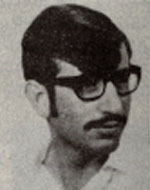Moshe, son of Esther and Yehuda, was born on the 3rd of Adar 1953, in Tel Aviv. He studied at the “Emunim” elementary school in Givatayim and later studied at the “Bnei Akiva” High School, the “Nehalim” Yeshiva, in the real sciences track and successfully passed the matriculation exams. Moshe grew up and was educated in the spirit of Jewish tradition and faith in the God of Israel, and absorbed the values of Judaism at home, in school, and in the Bnei Akiva youth movement. He adhered to his faith and kept the commandments, both light and severe, during his military service and during the difficult times of the fighting. From letters he wrote to his teacher, one can learn about the doubts that were the lot of a young believer who wanted to observe the commandments, and at the same time he had to carry out the orders of the army. He was an outstanding student and achieved great achievements, especially in the field of exact sciences. He liked to deal with problems in mathematics and physics and was satisfied when he came to the right solution. Moshe read a lot of serious books, especially science books, and he continued to increase his library until he included many books in his field of interest. During his service in the IDF, he devoted his free time to rehearsing and rehearsing the study materials in preparation for the entrance exams to the Technion in Haifa, where he wanted to study engineering and computer science, He worked in craftsmanship and the great collection of woodwork that was left behind, attests to his great talent and his ability to express himself through works of art, he was an outstanding athlete, dealt in soccer and basketball, and was a member of the national team. His school and the staff of the “Elizur” group in the Bnei Akiva youth movement Moshe was a pleasant young man, noble and loved by his friends because of his positive qualities and his willingness to always help anyone, Moshe was drafted into the IDF in mid-August 1971 and volunteered to serve in the Golani Brigade. After basic training, he completed a combat paramedics course and was sent to serve as a combat medic in the First Bounty Regiment. In this capacity he could give expression to his love of man and his willingness to help anyone in need. During the Yom Kippur War, he and his comrades participated in the battles of containment and infiltration against the Syrians in the Golan Heights. After the war, his comrades found fragments of a diary that Moshe wrote while he was moving to battle, riding a half-track, and a truce between mission and mission, emphasizing his willingness to fulfill any mission, and faith and confidence in his unit’s ability to withstand the enemy. 1973. Moshe was killed and killed in the battle to conquer the Hermon position, he was brought to eternal rest in the Kiryat Shaul cemetery, left behind by his parents and sister, and was later promoted to the rank of sergeant. During the elementary school period, he planned to build a home with her in Israel, and wrote a letter of condolence to the bereaved family The unit: “The Yom Kippur War was undoubtedly the most difficult one in Israel’s wars and the war was over our lives in this country. The Battle of the Hermon was perhaps the most difficult battle in this war. Your son, who fell in this battle, fought with his friends as only those who knew what he fought for bravely, bravely, with devotion and sacrifice. We do not try because we can not comfort you with the loss of your son, even though we, his comrades in the First Bounty Battalion, have the feeling of losing a son of a warrior, a feeling that is accompanied by a sense of respect for us. Yeshiva students who fell in the Yom Kippur War, a Torah scroll that was introduced to my heartThe Knesset’s sitting.
